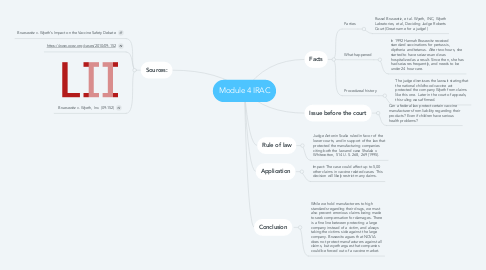Module 4 IRAC
por Michael Lardner

1. Sources:
1.1. Bruesewitz v. Wyeth’s Impact on the Vaccine Safety Debate
1.2. https://www.oyez.org/cases/2010/09-152
1.3. Bruesewitz v. Wyeth, Inc. (09-152)
2. Facts
2.1. Parties
2.1.1. Russel Brusewtiz, et al. Wyeth, INC, Wyeth Labratories, et al, Deciding Judge Roberts Court (Great name for a judge!)
2.2. What happened
2.2.1. In 1992 Hannah Brusewitz received standard vaccinations for pertussis, diptheria and tetanus. After two hours, she started to have seizures and was hospitalized as a result. Since then, she has had seizures frequently, and needs to be under 24 hour care.
2.3. Procedureal history
2.3.1. The judge dismisses the lawsuit stating that the national childhood vaccine act protected the company Wyeth from claims like this one. Later in the court of appeals, this ruling was affirmed.
3. Issue before the court
3.1. Can a federal law protect certain vaccine manufacturers from liability regarding their products? Even if children have serious health problems?
4. Rule of law
4.1. Judge Antonin Scalia ruled in favor of the lower courts, and in support of the law that protected the manufacturing companies citing both the law and case Shalala v. Whitecotton, 514 U. S. 268, 269 (1995).
5. Application
5.1. Impact: The case could affect up to 5,00 other claims in vaccine related cases. This decision will likely restrict many claims.
6. Conclusion
6.1. While we hold manufactorers to high standards regarding their drugs, we must also prevent erronious claims being made to seek compensation for damages. There is a fine line between protecting a large company instead of a victim, and always taking the victims side against the large company. Brusewitx agues that NCVIA does not protect manufacturers against all claims, but wyeth argues that companies could be forced out of a vaccine market.


